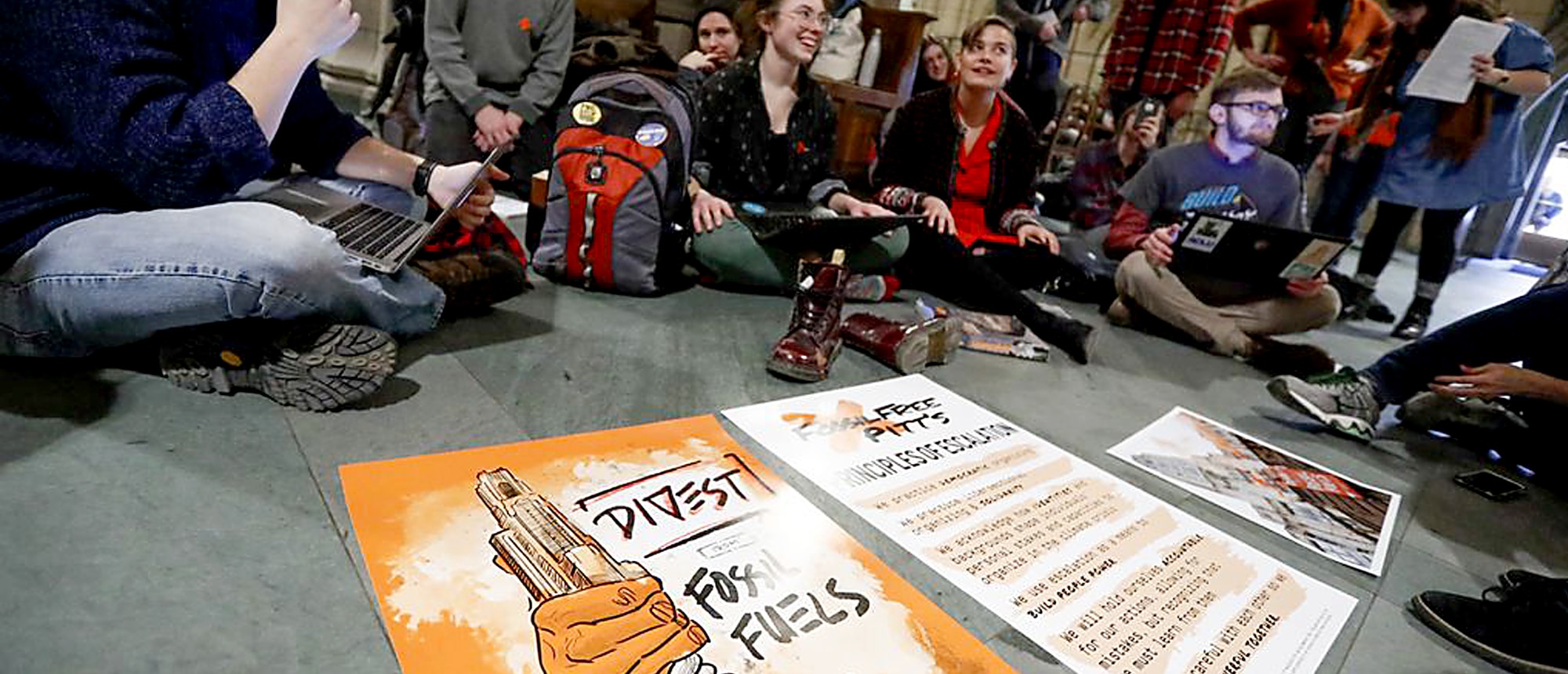Universities Should Listen To Their Students On Climate Change
Since the US fossil-fuel divestment movement started in earnest in November 2012, with the launch of Go Fossil Free by the climate group 350.org, universities have considered whether to divest fossil fuels from their endowments.
Students have pushed university administrators to divest, while administrators have pushed back, lecturing students about the “real world” of sound investing and the purported need to keep fossil fuels in the endowments. Eight years on, the lessons are clear. The students are the ones living in the real world, while university administrators, trustees, and endowment managers have been living in an energy fantasyland.
The divestment movement was launched because it was clear to climate scientists that the three fossil fuels — oil, coal, and gas — would have to be phased out and replaced by renewable energy sources, such as wind and solar power, in order to avoid catastrophic climate change. The shift from carbon-based fossil fuels to renewable energy is known as decarbonization. We are in no danger of running out of fossil fuels, but relying on them, as many reports have warned, is dangerous. In order to pursue a safe path to decarbonization by 2050, those reports demonstrate a significant share of the fossil fuel reserves as of 2012 would have to be “stranded,” or left underground.
The implications were clear enough to close observers. Major oil, gas, and coal companies that were touting new multibillion-dollar exploration and development projects, including the fracking of unconventional oil and gas, were on the wrong track, squandering shareholder wealth by developing new reserves that would never be used. Share prices would eventually be marked down. Industry forecasts of decades of rising fossil fuel use would prove wrong.
The fossil-fuel industry was therefore already a bad bet in 2012, except to industry lobbyists and to money managers looking backward rather than forward. The US fossil-fuel industry perhaps came to believe its own hype, that with enough lobbying clout there would be smooth sailing in the years ahead. Yet despite President Trump’s pro-fossil-fuel policies, and his withdrawal of the United States from the Paris climate accord, most governments around the world, and indeed most state governments in the United States, are sticking with the Paris accord and are cutting back on fossil fuels and shifting to renewable energy.
If more university administrators had understood these facts earlier, they would have listened to their students, not their money managers or their donors. They might have recognized that well-heeled donors linked to the fossil-fuel industry who opposed divestment were not necessarily promoting the interests of the university over the fossil-fuel companies.
Consider the high cost of not divesting early on. From Nov. 15, 2012, around the time that 350.org launched its divestment campaign, until Feb. 28, 2020, the S&P 500 Index soared from 1,353 to 2,954, more than doubling. Yet ExxonMobil shares fell from $86 to $51; Chevron shares fell from $103 to $93; an oil-exchange-traded fund (HUC.TO) went from $20 to $11; and a coal-exchange traded fund (KOL) fell even further, from $23 to $8. (All numbers are rounded to the nearest dollar).
It is poignant to look back at the letter that the then-president of Harvard University, Drew Faust, sent to the Harvard community in October 2013. She wrote in opposition to the student calls for divestment, declaring: “We should also be clear-sighted about the risks that divestment could pose to the endowment’s capacity to propel our important research and teaching mission. Significantly constraining investment options risks significantly constraining investment returns.” Harvard’s current president, Larry Bacow, has continued the opposition to divestment, even as Harvard’s faculty has recently voted overwhelmingly to support divestment.
There are in fact two interconnected issues at stake. In her 2013 letter, Faust objected to using ethical guidelines to direct the Harvard endowment portfolio. Even if confronting climate change is ethically urgent, she was claiming, the endowment should not be utilized for that purpose, since the university’s responsibility is its education program. Many universities have continued to take this line. Yet no organization, not even a university, should simply wash its hands of moral responsibilities because of its main purposes.
University leaders have continued to neglect a second practical issue: that fossil fuel investments were (and are) a poor prospect. The ethical perspective and the market perspective are not that different in this case. Because climate change is so threatening to human well-being, and therefore an ethical imperative on which most of the world has agreed to decisive action, investments in fossil fuels are a poor bet for the long term. It’s not wise to bet on an industry from which the world economy is already shifting and must ultimately phase out.
With the costs of solar and wind power plummeting, and with massive technological advances in batteries, electric vehicles, and other technologies to shift from fossil fuels, the pace of decarbonization will continue to advance, and the shrinkage of the fossil-fuel industry will accelerate. Lobbyists will do their best to slow this decline, but they will not reverse it; the climate crisis is too grave to ignore. It’s long past time for our universities, pension funds, and indeed asset managers and bankers generally to recognize that the students are spot on. The fossil-fuel industry is on the way out, and divestment meets both the ethical and the practical investment test. Indeed, in our dire climate emergency, ethics and good investment practice are the same.
Divestment, of course, is only a modest part of the full decarbonization story. University endowments and other portfolio owners today invest primarily in index funds in order to own a representative slice of the market. The big sellers of these index funds — such as BlackRock, State Street, and Vanguard — need urgently to change their own behavior. These sellers should be marketing only decarbonized index funds and should be pushing the companies in their portfolios toward decarbonization. Universities should pick asset managers who are taking those steps and leave the others behind. Of course governments also urgently need to act, by setting a policy path to decarbonization by 2050, in line with the objectives of the Paris climate accord. In the years ahead, the smart money will be on the side of divestment and decarbonization.








